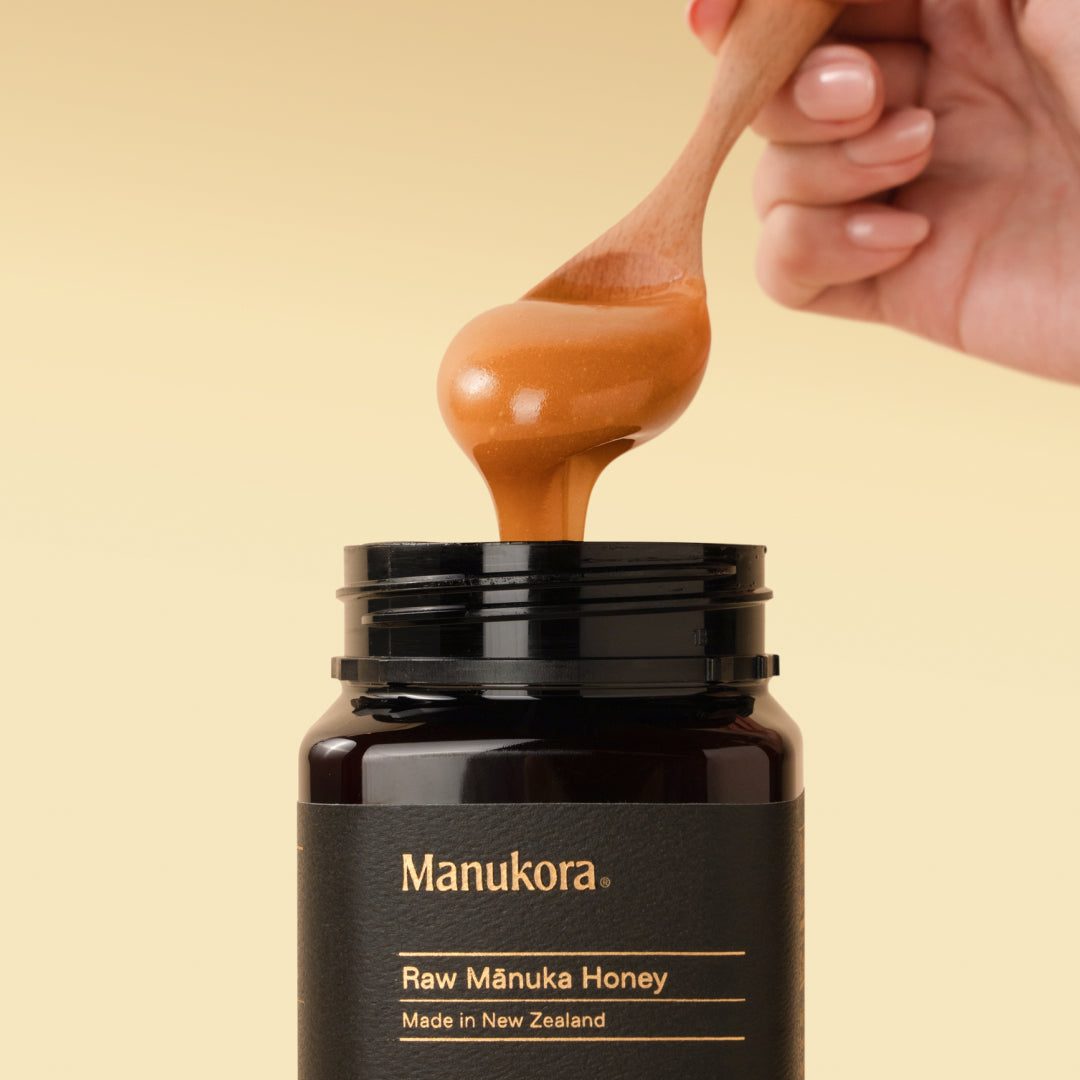Executive Summary:
-
The ketogenic diet is a low-carbohydrate, high-fat, and high-protein diet.
-
Sugar and honey contain significant amounts of carbohydrates, and both can disrupt ketosis.
-
Sugar offers little to no health benefits, while honey contains prebiotics, antioxidants, and methylglyoxal (MGO).
-
While honey may be consumed in moderation in a low-carb diet, keto enthusiasts may opt for an alternative no-carb or low-carb sweeteners.
Honey vs. Sugar: Keto Diet Sweetener Showdown
The ketogenic diet has gained widespread popularity for those seeking better energy levels, metabolic support, and weight management.
At its core, the keto lifestyle emphasizes high-fat, low-carb eating, which naturally raises questions about sweeteners and their role.
Since sugar is a high-glycemic carbohydrate, it’s usually one of the first ingredients to go. But what about honey specifically, Manuka honey, known for its rich nutrient profile and unique natural compounds?
In this article, we’ll explore how traditional table sugar compares to Manuka honey when it comes to carb content, glycemic impact, and nutritional value especially for those following a keto or low-carb approach.
While neither is truly “keto,” understanding the quality and function of the sweetener you choose can help support a more mindful lifestyle.
Understanding Sugar and Its Effects on Keto
When it comes to sweeteners and the keto diet, it's important to understand the basic types of sugar we encounter in everyday foods. The most common forms include glucose, fructose, and sucrose.
-
Glucose is the body’s primary source of energy and the main sugar found in the bloodstream.
-
Fructose, often called “fruit sugar,” is a naturally occurring simple sugar found in fruits, vegetables, and honey.
-
Sucrose, more commonly known as table sugar, is a compound made of both glucose and fructose. While it’s naturally present in many plant-based foods, it’s typically extracted from sugar cane or sugar beets for use in packaged products.
Because the keto diet relies on severely limiting carbohydrates, these sugars especially when refined or concentrated can disrupt ketosis. Even natural sources of sugar, like honey or fruit, must be approached with awareness depending on one’s carb goals.
Sugar’s Impact on Ketosis
For those following a ketogenic lifestyle, maintaining the state of ketosis where the body shifts from using carbohydrates to burning fat for energy is a central goal. In this state, the body produces ketone bodies from stored fat, which then serve as an alternative fuel source.
However, sugar regardless of form can disrupt this process. When sugar is consumed, it raises blood glucose levels, signaling the body to return to using glucose for energy rather than fat.
Since the body generally prefers glucose when it’s available, even small amounts of sugar can slow or pause the body’s fat-burning rhythm.
Even small amounts of sugar can shift the body out of ketosis by reintroducing glucose as its primary energy source.
— Nutrition Review Summary, Journal of Metabolism and Nutrition
That’s why refined sugars and high-glycemic sweeteners are typically minimized or avoided on the keto diet.
Still, not all natural sweeteners are equal, and understanding the nutritional context and impact of what you consume can help you make more informed choices even if you're not strictly keto.
The Role of Honey in a Keto Diet
Honey is often admired for its natural origin and nutrient content, including trace vitamins, minerals, and unique compounds like MGO (methylglyoxal) found in Manuka honey. But when it comes to low-carb or ketogenic lifestyles, honey can be a topic of debate.
That’s because honey, while natural, still contains sugars in the form of glucose and fructose. A single tablespoon contains approximately 17 grams of carbohydrates, which can take up a significant portion of a typical keto diet’s daily carb limit (often around 20–50 grams).
Honey contains more than just sugar—it’s a natural source of trace nutrients, enzymes, and compounds that contribute to its complexity.
That said, not all keto approaches are the same. Some individuals follow targeted or cyclical keto diets, which allow for more flexibility in carbohydrate intake. In such cases, a small amount of honey particularly one rich in natural compounds and nutrients may be thoughtfully included.
Ultimately, it comes down to understanding your body’s response and your specific keto goals. If you’re focused on whole, high-quality foods, honey might have a place in your lifestyle even if not in strict daily rotation.
Honey vs. Sugar on a Keto Diet: A Nutritional Comparison
|
Feature |
Honey |
Table Sugar |
|
Carbohydrates (per tbsp) |
~17 grams |
~13 grams |
|
Glycemic Index (GI) |
55 ±5 |
68 ±5 |
|
Nutritional Content |
Contains trace vitamins, minerals, and compounds like MGO (in Manuka) |
Provides calories only; no added nutrients |
|
Effect on Ketosis |
May disrupt ketosis due to glucose content |
Also disrupts ketosis; quickly spikes blood sugar |
|
Sweetness Profile |
Naturally derived, with nuanced flavor |
Refined, singular sweetness |
|
Whole Food Source |
Yes — minimally processed from natural origins |
No — heavily refined and processed |
|
Contextual Use in Keto |
May fit targeted/cyclical keto in small amounts |
Generally avoided in keto |
Alternatives and Recommendations for Keto Dieters
While both sugar and honey contain carbohydrates that can impact ketosis, some individuals following modified or flexible keto approaches may choose to incorporate small amounts of natural sweeteners depending on their personal goals and carb limits.
However, for those aiming to strictly limit carbs, several keto-friendly alternatives offer sweetness without significantly affecting blood sugar levels. Common options include:
-
Stevia
-
Erythritol
-
Monk fruit extract
These sweeteners are popular in keto communities for their low glycemic impact and are often used in recipes, beverages, and snacks.
While they don't offer the same nutrient complexity as whole food sweeteners like honey, they can help satisfy a sweet craving while staying within daily carb targets.
There’s no one-size-fits-all approach. What matters most is choosing a sweetener that supports your wellness goals and feels right for your body.
You might consider adding a pinch of your preferred alternative sweetener to a chilled beverage, a no-bake snack, or a warm drink after it has cooled slightly. Keep in mind that substitution ratios can vary, so it’s helpful to adjust based on taste and the specific recipe.
FAQs
Is honey allowed on a keto diet?
Honey contains natural sugars and carbohydrates, so it’s not typically recommended for strict keto diets. However, individuals following more flexible versions of keto may include small amounts mindfully, depending on their daily carb limits.
What’s better for keto—honey or sugar?
From a keto standpoint, both honey and sugar can raise blood glucose levels and impact ketosis. However, honey offers trace nutrients and compounds not found in refined sugar, making it a more nutrient-dense choice when used in moderation.
Does honey have a lower glycemic index than sugar?
Yes. Honey generally has a glycemic index of around 55, while sugar is around 68. This means honey may cause a slightly slower rise in blood glucose levels compared to sugar.
Can I replace sugar with honey in keto recipes?
While both contain carbs, some individuals on flexible keto plans may substitute small amounts of honey in recipes. Always consider the total carbohydrate count and your personal dietary goals before doing so.
What are the best keto-friendly sweeteners?
Popular low-carb sweeteners include stevia, erythritol, and monk fruit extract. These are often used in keto recipes as alternatives to sugar or honey due to their minimal impact on blood sugar levels.
Why do some people choose honey over artificial sweeteners?
Many people prefer honey for its natural origin, trace nutrients, and rich flavor. While it contains carbs, it’s a whole food sweetener that aligns with more natural eating habits.
Choose a Sweetener that Matches Your Needs
Both honey and sugar offer sweetness, but their nutritional profiles are far from identical. While table sugar provides only empty calories, honey, especially high-quality Manuka honey offers naturally occurring nutrients and unique compounds like MGO that contribute to a more mindful sweetener choice.
For those following a ketogenic or low-carb lifestyle, the right option depends on your individual goals, carb tolerance, and preferences. Some may lean toward zero-carb alternatives, while others might choose to enjoy small amounts of honey within a balanced, whole-food lifestyle.
At the end of the day, it’s about finding what works for your body and your routine. If you’re seeking a sweetener rooted in nature with traceable origins and thoughtful harvesting practices, Manukora offers a range of premium Manuka honeys crafted with care and tradition.
Explore our MGO 600+, 850+, and 1000+ starter kits to experience what makes this golden honey so special naturally sweet, wonderfully rich, and always traceable to the source.


















